Dreaming of a Dead Person Dying Again Meaning: Explain!
Dreaming of a dead person dying again can be a perplexing experience that may stir up a mix of emotions. Such dreams often symbolize an aspect of your life that has undergone a transformation or an end to a particular phase.
It might also represent unresolved feelings or issues related to the departed person, or the dreamer’s struggle with acceptance and moving on.
Dreams about a dead person dying again can have various interpretations based on the context of the dream and the dreamer’s personal life:
For example, if you dream that a beloved grandmother who passed away is dying again, it might symbolize your struggle to adapt to life without her wisdom and support.
Dreams involving the death of a deceased loved one can be a manifestation of deep-seated emotions or life transitions, reflecting the dreamer’s internal journey.
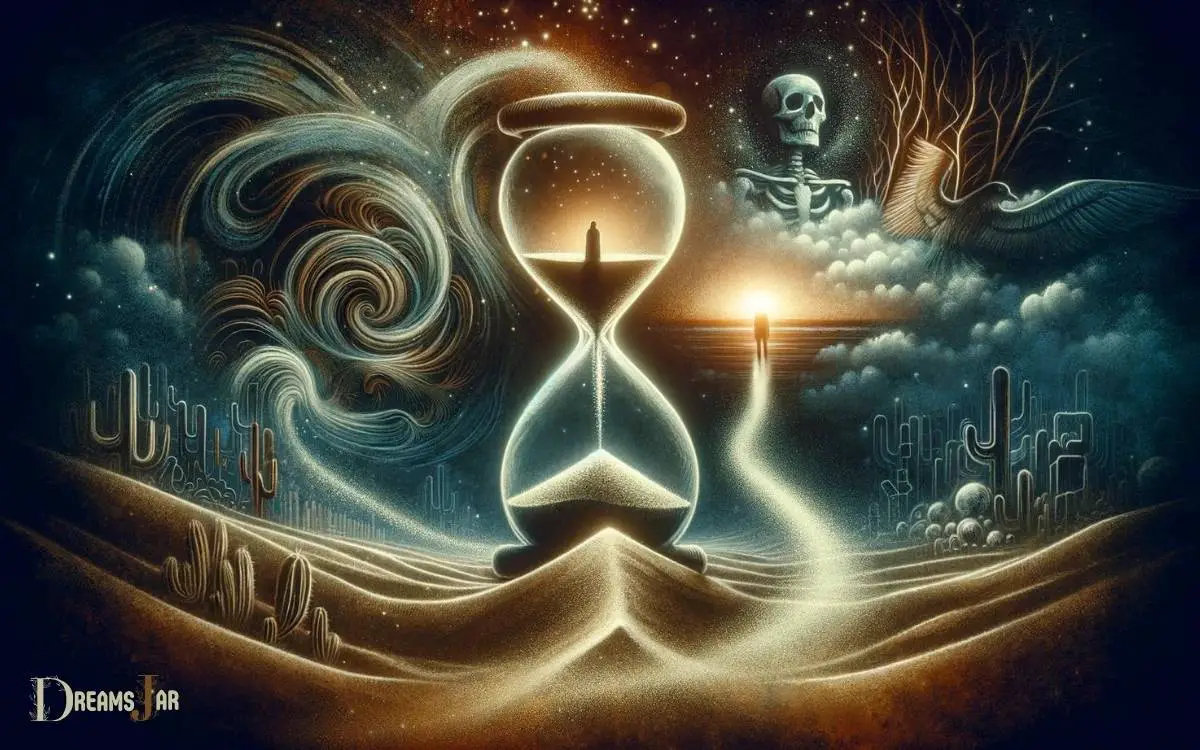
Key Takeaway
Historical and Cultural Perspectives
From my research, historical and cultural perspectives on dreaming of a dead person dying again reveal intriguing insights into the human psyche and spirituality.

Throughout history, various cultures have viewed dreams as a means of communication with the spirit world.
- In ancient Egypt, dreams were considered a way for the living to connect with the deceased, offering guidance and wisdom from the afterlife.
- Similarly, in some Native American traditions, dreaming of a dead person dying again could be seen as a symbolic message from ancestors, carrying important teachings or warnings.
Understanding these cultural beliefs provides a window into the significance placed on dreams and the continuity of life beyond death. It underscores the universal human desire to seek meaning and connection, even in the realm of dreams.
Psychological and Emotional Analysis
When we dream of a dead person dying again, it can stir up complex emotions and thoughts. These dreams often carry deep symbolic meanings and can serve as a way for our unconscious mind to process unresolved grief.
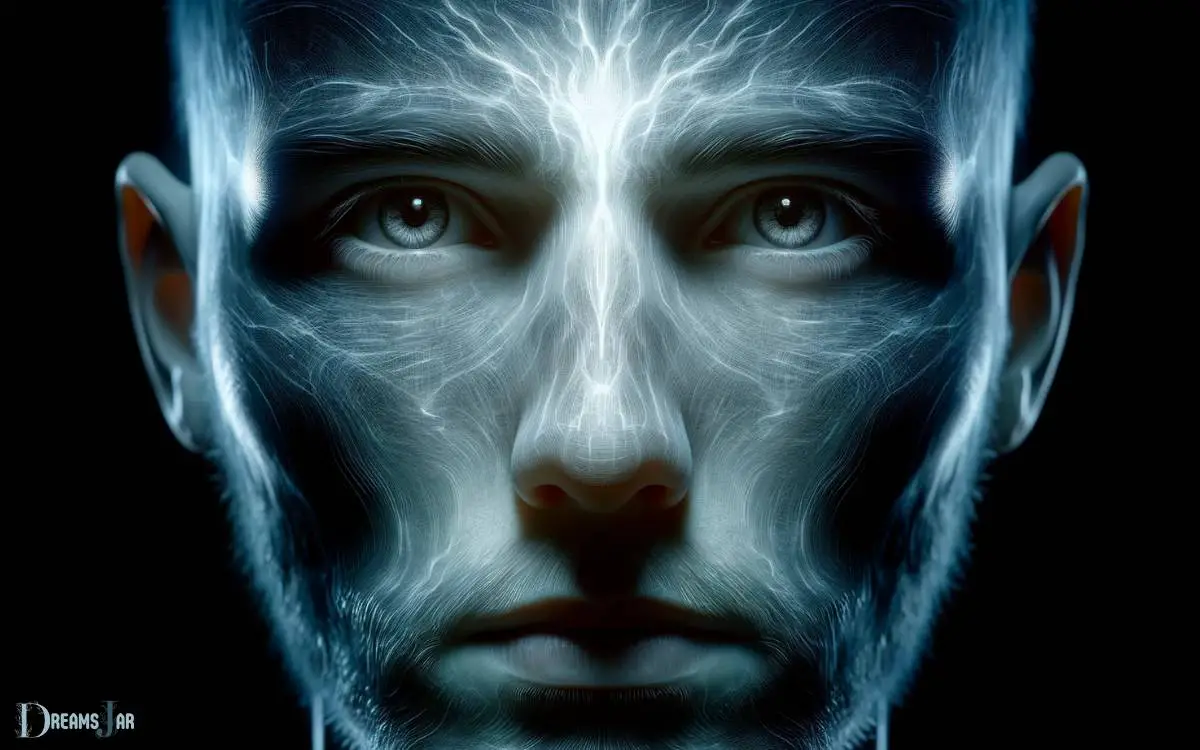
Understanding the psychological and emotional aspects of these dreams can provide insight into our coping mechanisms and inner struggles.
Symbolism in Dreams
Exploring the symbolism in dreams provides valuable insight into one’s psychological and emotional state. As a licensed therapist, I’ve found that understanding the symbolic meaning behind dream imagery can be a powerful tool for self-reflection and personal growth.
Here are a few key insights into the symbolism of dreams:
- Personal Symbols: Symbols in dreams often represent deeply personal experiences, emotions, or relationships.
- Unconscious Thoughts: Dreams can offer a window into our unconscious thoughts and desires, providing an opportunity for introspection.
- Emotional Processing: Symbolism in dreams can help individuals process and make sense of complex or overwhelming emotions.
- Psychological Significance: Analyzing dream symbols can offer valuable clues about one’s psychological well-being and inner conflicts.
By delving into the symbolism of dreams, individuals can gain a deeper understanding of their inner world, paving the way for healing and growth. Understanding dream symbolism is just one step in the journey of coping with loss.
Coping With Loss
Understanding the psychological and emotional impact of coping with loss is essential for navigating the grieving process. Grief is a deeply personal experience, and there is no one-size-fits-all approach to coping with it.
It’s okay to feel a range of emotions, from sadness and anger to confusion and even relief. It’s important to give yourself permission to grieve in your own way and at your own pace.
Surrounding yourself with supportive and understanding individuals can provide a sense of comfort and help ease the burden of grief. Engaging in self-care activities, such as exercise, meditation, or spending time in nature, can also be beneficial.
Remember, it’s okay to seek professional help if you’re finding it difficult to cope on your own. Seeking support is a sign of strength, not weakness.
Unconscious Processing of Grief
As I delve into the unconscious processing of grief, it becomes evident that dreams can serve as a significant outlet for the psychological and emotional analysis of loss.
Here are some key aspects to consider in this process:
- Symbolism: Dreams often use symbols and metaphors to represent our emotions and thoughts about the deceased, providing a platform for subconscious exploration.
- Emotional Release: Dreaming about a dead person dying again can act as a cathartic experience, allowing suppressed emotions to surface and be processed.
- Integration of Loss: Dreams may aid in integrating the reality of the loss into our emotional and psychological framework, promoting acceptance and healing.
- Unresolved Issues: They can also bring unresolved issues or unexpressed emotions to light, offering an opportunity for acknowledgment and resolution.
Understanding the unconscious processing of grief through dreams can offer valuable insights into our emotional and psychological responses to loss.
Spiritual and Supernatural Interpretations
When dreaming of a dead person dying again, it can often be attributed to revisiting unresolved spiritual connections, symbolizing the renewal of closure or indicating supernatural communication through dreams.

These experiences can lead individuals to seek spiritual and supernatural interpretations for the symbolism and messages they encounter, offering a unique perspective on the significance of such dreams.
Understanding the spiritual and supernatural aspects of these dreams can provide insight into their deeper meaning and impact on our lives.
Revisiting Unresolved Spiritual Connections
Experiencing a recurring dream of a deceased person’s demise can signal a reawakening of unresolved spiritual connections, prompting introspection and a deeper exploration of supernatural interpretations.
When encountering such dreams, it’s important to consider the following:
- Reflect on the Relationship: Take time to reflect on the nature of the relationship with the deceased individual and any lingering spiritual connections that may be influencing these dreams.
- Seek Spiritual Guidance: Consider seeking guidance from spiritual leaders, such as a trusted religious advisor or a medium, to gain insight into the spiritual significance of these dreams.
- Practice Meditation and Prayer: Engage in meditation and prayer to connect with the spiritual realm and seek understanding of the messages being conveyed through these dreams.
- Explore Symbolism: Pay attention to any symbolic elements in the dreams, as they may hold clues to the unresolved spiritual connections with the deceased individual.
As we delve deeper into the spiritual and supernatural interpretations of these recurring dreams, it’s crucial to explore the symbolic renewal of closure that may be sought through these experiences.
Symbolic Renewal of Closure
Upon revisiting these recurring dreams of a deceased person’s demise, I find myself seeking symbolic renewal of closure through deeper exploration of spiritual and supernatural interpretations.
These dreams may symbolize the need for closure and healing, signaling a spiritual message that the unresolved emotions tied to the departed person require attention.
In many cultures, dreams are seen as a way for the departed to communicate with the living, offering an opportunity for closure and reconciliation.
The supernatural interpretations of these dreams often emphasize the idea of spiritual release and the need to let go of any lingering attachments or guilt.
By delving into these symbolic and supernatural meanings, we can find comfort in the thought that these dreams may be a way for the departed to convey a message of peace and closure, allowing us to move forward with renewed strength.
Supernatural Communication in Dreams
As I delve into the topic of supernatural communication in dreams, I continue to explore the symbolic and supernatural meanings associated with the recurring dreams of a deceased person’s demise, seeking deeper understanding and closure.
In the realm of spiritual and supernatural interpretations, communication through dreams is believed to convey messages from the afterlife.
Here are some key points to consider:
- Symbolic Messages: Dreams may serve as a medium for the departed to convey important messages or guidance.
- Emotional Connection: These dreams may reflect the unresolved emotions or lingering thoughts associated with the deceased individual.
- Visitation: Some believe that these dreams represent the spiritual visitation of the deceased, offering comfort or closure to the dreamer.
- Intuitive Insights: Paying attention to these dreams can provide intuitive insights and facilitate the healing process.
Understanding the potential for supernatural communication in dreams can offer solace and a sense of connection with the departed.
Common Symbolism and Metaphors
I often find that dreams of a dead person dying again can be filled with common symbolism and metaphors that can provide insight into our subconscious thoughts and emotions.
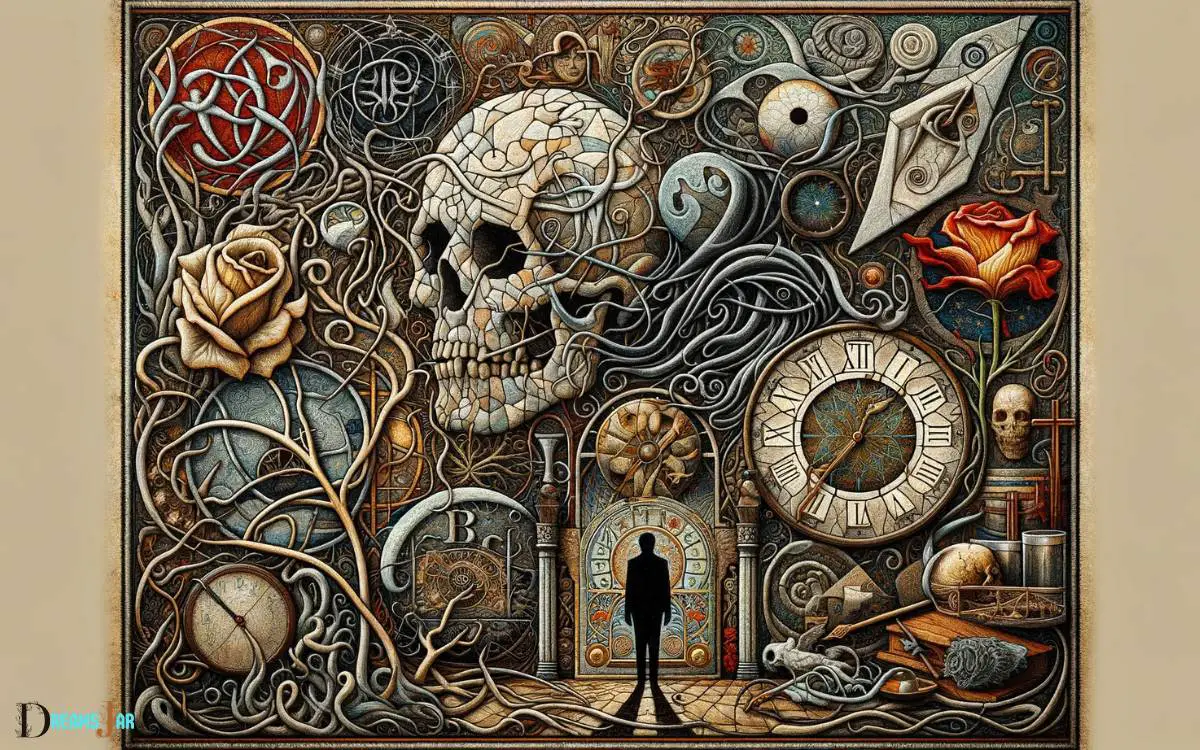
In such dreams, the imagery and actions often carry deeper meanings that reflect our inner psyche.
Here are some common symbols and metaphors that may appear in dreams of a dead person dying again:
| Symbol/Metaphor | Meaning |
|---|---|
| Death | Transition or change |
| Coffin | Letting go or closure |
| Funeral | Grief or acceptance |
| Resurrection | Renewal or second chances |
| Ghost | Unresolved issues or memories |
Understanding these symbols and metaphors can help unravel the messages that our subconscious mind is trying to communicate through these vivid dreams.
Personal Grief and Subconscious Manifestations
Experiencing the loss of a loved one can stir up deep emotions and lead to subconscious manifestations in dreams.

I have personally experienced this, and I understand how personal grief can intertwine with our subconscious mind, resulting in vivid dreams that reflect our inner turmoil.
Here are some insights into how personal grief can manifest in dreams:
- Emotional Processing: Dreams can serve as a way for the mind to process and make sense of the intense emotions associated with grief.
- Seeking Closure: The subconscious may use dreams as a means to seek closure or resolution for the unresolved feelings surrounding the loss.
- Symbolic Representations: Often, dreams may present symbolic representations of the departed loved one, reflecting the deep emotional impact of their absence.
- Coping Mechanism: Dreams can serve as a coping mechanism, providing a space to express and confront the pain of loss in a subconscious realm.
Revisiting Unresolved Issues and Regrets
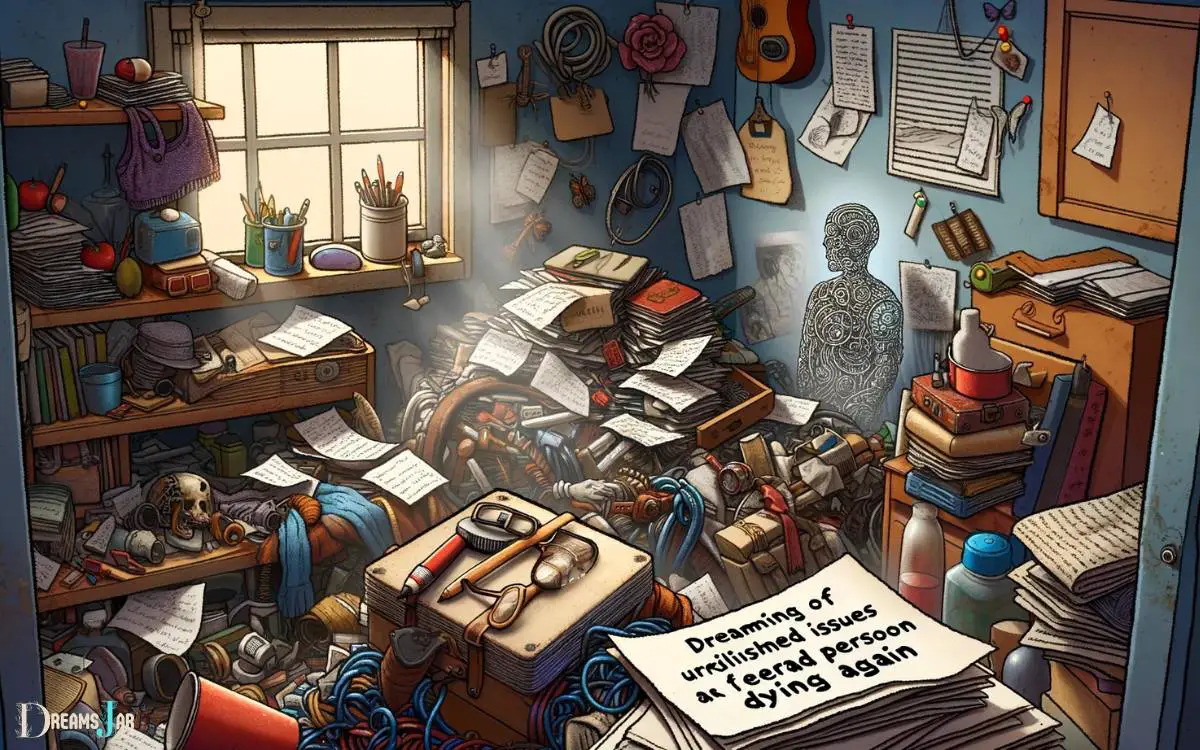
When revisiting unresolved issues and regrets in dreams, the mind continues its emotional processing by delving into specific moments and interactions that contribute to the lingering sense of loss.
In my dreams, I often find myself confronting situations that were left unresolved with the deceased. These dreams provide an opportunity to explore the “what ifs” and the things left unsaid.
It’s as if my subconscious is urging me to address these unresolved emotions and seek closure. The dreams bring to light the weight of regrets and the longing for a chance to make amends.
They remind me of the importance of resolving conflicts and expressing sentiments before it’s too late.
Communicating With the Afterlife
Certainly! Sometimes, one may feel a strong desire to communicate with the afterlife, seeking closure and solace.

When it comes to communicating with the afterlife, there are several approaches to consider:
- Meditation and Prayer: Engaging in quiet reflection and prayer can create a space for potential communication with the afterlife.
- Visiting Places of Significance: Being in a location that held special meaning for the deceased can evoke their presence and facilitate communication.
- Seeking the Guidance of a Medium: A reputable medium can act as a bridge between the living and the afterlife, providing an opportunity for communication.
- Writing Letters or Keeping a Journal: Expressing thoughts, feelings, and messages to the departed can provide a sense of connection and closure.
These methods can offer solace and comfort, aiding in the reconciliation and healing processes that follow.
Reconciliation and Healing Processes
In my quest for understanding, I find solace and healing through the process of reconciliation with the departed. When I dream of a deceased loved one dying again, it can bring up unresolved emotions and questions.
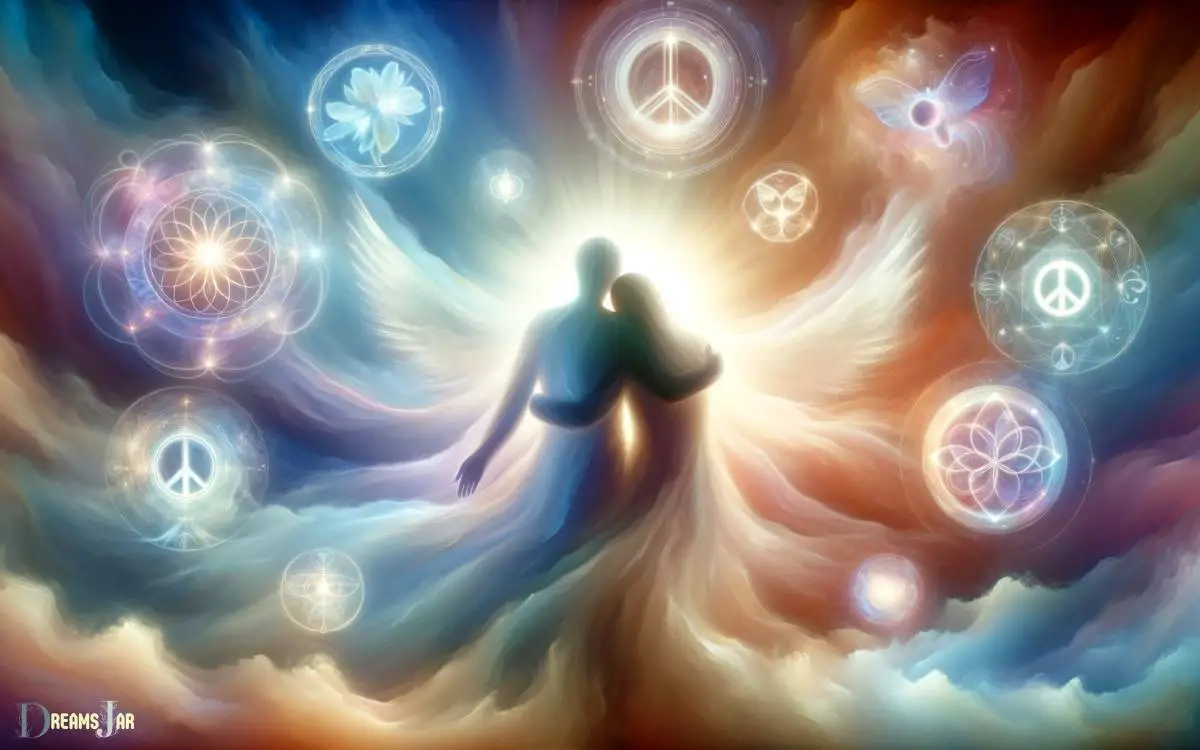
Engaging in reconciliation involves acknowledging these feelings and seeking closure. This might involve reflecting on past conflicts or unspoken words, and finding a way to make peace within myself. It’s a personal journey that can lead to healing and acceptance.
Talking to others who have experienced similar dreams can also provide comfort and a sense of shared understanding.
Through this process, I’ve come to realize that dreams of a dead person dying again can be a catalyst for inner healing and a reminder of the importance of addressing lingering emotions tied to loss.
Seeking Closure and Peace
My approach to seeking closure and peace involves confronting unresolved emotions and finding inner healing. This process is deeply personal and can take time, but it is essential for moving forward.

Here are some steps I have found helpful in seeking closure and peace:
- Acknowledging the Pain: I allow myself to recognize and accept the pain I am feeling, without judgment or criticism.
- Expressing Emotions: I find healthy ways to express my emotions, whether through journaling, talking to a trusted friend, or seeking therapy.
- Forgiveness: I work towards forgiving myself and others involved, understanding that forgiveness is a gift I give to myself.
- Finding Meaning: I seek to find meaning in the experience, focusing on personal growth and the lessons learned.
Conclusion
In the end, dreaming of a dead person dying again can be a powerful way for our minds to process grief, seek closure, and find peace. It’s like a bittersweet symphony, playing out the echoes of our emotions and memories.
Our dreams become a canvas for our subconscious to paint the colors of our innermost thoughts and feelings, helping us navigate the journey of loss and healing.






